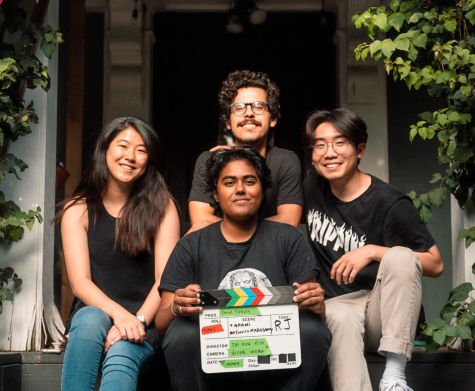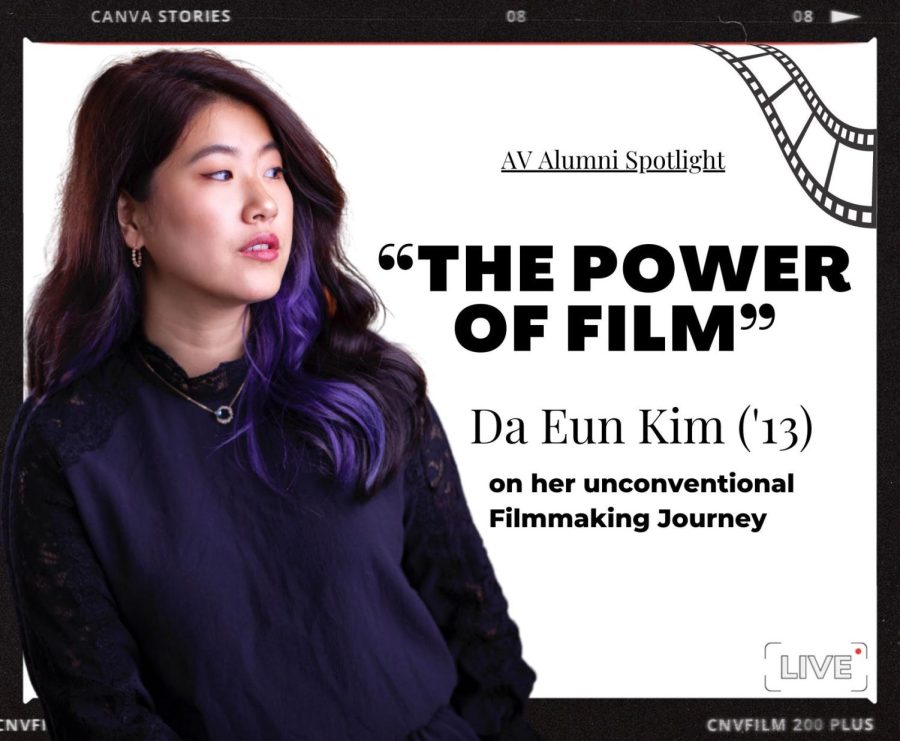Alumni spotlight: Da Eun Kim (‘13) on her unconventional filmmaking journey
“Perfectionism is kind of the bane of our existence, the need to do everything right, and to do it the way that has been done before. It’s through the messiness and letting yourself fail, make mistakes, and just be adventurous is what’s truly going to lead to the most fruitful lessons,” said Da Eun Kim.
From a young age, watching films was Da Eun Kim (‘13)’s outlet from reality. She has always been enchanted with fantasy films like Coco, Avatar the Last Airbender, and Percy Jackson. But Kim never thought about becoming a filmmaker–not until she took a filmmaking course to fill up her empty units as a junior in college.
“I would say it was like the first time that I got genuinely really curious to learn more about the behind the scenes of the filmmaking process. And it wasn’t because someone was telling me that it’s something I should be passionate about, or something that I should look into. It was purely motivated by myself,” said Kim.
Little did Kim know that her curiosity would lead to her passion in the behind the scenes of the filmmaking process.
“I love how all of the characters in these three meet forms of media have all tried to subvert their destiny in some ways. There is always a new way to explore doing things and to never settle for just how things have been done before,” said Kim.
These films inspired Kim to focus on meaningful themes like knowing one’s history, treasuring one’s family background, and maturing in society. But Kim’s films all center around one specific theme: family.
“My films have honestly opened up a huge window of opportunity for me and my parents to bond in new ways that we had never done before. And by watching films, I’m able to organically ask them questions and be curious about what’s happened in their life or see what they’re resonating with and dig a little bit deeper into that,” said Kim.
As an only child of two Korean immigrant parents, Kim grew up moving around the U.S. and Asia more than 20 times in her life. For Kim, family was the one constant in her life.
“As much as I love (my family), there definitely had been times in my adolescence where they would get on my nerves, (and) we would get into so many conflicts. I felt like they never understood me. And they also felt the same way about their immigration story and everything,” said Kim.

Kim’s interest in filmmaking was hidden from her parents until she revealed one of her films, I love you, to her parents. Kim directed the film to encapsulate everything she wanted to say to her parents, but never knew how to put into words.
“At that point, my parents kind of like a complete 180 and were 100% in support of my creative endeavors. I think that just shows the power of film and how fast people can turn around once they see a perspective and also see what can be done,” said Kim.
She continued to pursue film projects on the side of her software engineer career after graduating from Stanford University. But her two-week Jubilee Media Fellowship program catapulted Kim onto the professional film set.
“It was a life changing experience. It taught me that there’s no time like the present, that you don’t need to know everything in order to go try something, even if it feels like you should be at a certain professional level in order to go do it as a profession,” said Kim.
Love 암마, a film inspired by Kim’s first interaction with Hmong culture from her previous relationship, featured different cultural backgrounds and family history in Korea and Laos. She believed that it was an injustice that no one knew about the courageous stories behind his family and Kim didn’t want to let the stories remain unsaid.
“It was a really great exercise in exploring what it means to represent an underrepresented story well,” said Kim.
Through working on these film projects on the side, Kim became curious about the film industry and longed to experience the classroom environment for film.
“I also felt that I needed to go to school in order to mentally make that leap of faith to go from ‘I am a software engineer’ to ‘I’m a filmmaker’, and I also wanted to explore what kind of filmmaking I want to do and what kind of roles I want to hold,” said Kim.
Working on films on the side was a hobby, and Kim wanted to change that. She decided to pursue a master’s degree at the University of Southern California in an effort to learn from professors and people who have worked in Hollywood.
“I think by doing everything very scrappily on the side while I was working, I don’t think I would have been able to really fully realize my potential if I didn’t go to school,” said Kim.
Even as she juggles working full-time as a software engineer with her film pursuits, Kim’s interest in the film industry has never waned.
“These films that I made were really trying to capture a lot of feelings and thoughts that I hadn’t yet processed. I think filmmaking is a very therapeutic journey for me, to be able to unpack all the layers of one emotion I might be feeling towards a person or towards an event,” said Kim.
She encourages young filmmakers to not be afraid of making mistakes in the process of learning and “let yourself be messy”.
“Perfectionism is kind of the bane of our existence, the need to do everything right, and to do it the way that has been done before. It’s through the messiness and letting yourself fail, make mistakes, and just be adventurous is what’s truly going to lead to the most fruitful lessons,” said Kim.
Your donation will support the student journalists in the AVJournalism program. Your contribution will allow us to purchase equipment and cover our annual website hosting costs.

